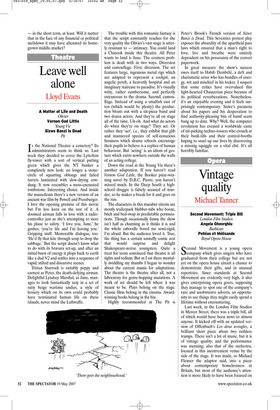Leave well alone
Lloyd Evans
A Matter of Life and Death Olivier Vernon God Little Young Vic Sizwe Banzi Is Dead Pit Is the National Theatre a cemetery? Its administrators seem to think so. Last week they decided to cover the Lyttelton fly-tower with a sort of vertical putting green which gives the NT bunker a completely new look: no longer a stonecircle of squatting oblongs and failed turrets laminated with slow-drying cowdung. It now resembles a moss-encrusted tombstone. Interesting choice. And inside the mausoleum there’s a new version of an ancient war film by Powell and Pressburger. I love the opening premise of this movie but I’m less keen on the rest of it. A doomed airman falls in love with a radiocontroller just as she’s attempting to steer his plane to safety. ‘I love you, June,’ he gushes; ‘you’re life and I’m leaving you.’ Gripping stuff. Memorable dialogue, too. ‘He’d fly that kite through soup to drop the cabbage.’ But the script doesn’t know what to do with its bravura set-up, and after an initial burst of energy it plops back to earth like a dud V2 and settles into a sequence of vapid, stilted and discursive scenes.
Tristan Sturrock is suitably peppy and earnest as Peter, the death-defying airman. Delightful Lyndsey Marshal, as June, manages to look fantastically sexy in a set of ratty beige wartime undies, a style of hosiery which on its own could probably have terminated human life on these islands, never mind the Luftwaffe. The trouble with this romantic fantasy is that the script constantly reaches for the very quality the Olivier’s vast stage is utterly resistant to — intimacy. You could land a Chinook inside this theatre. All Peter wants to land is June. The cosiness problem is dealt with in two ways. Diversion and camouflage. First, diversion. The set features large, ingenious metal rigs which are adapted to represent a cockpit, an angelic perch, a heavenly hospital and an imaginary staircase to paradise. It’s visually witty, rather cumbersome, and perfectly extraneous to the drama. Second, camouflage. Instead of using a smallish cast of ten (which would be plenty) the production bloats out with a six-piece band and two dozen actors. And they’re all on stage all of the time. Uh-oh. And what do actors do when they’re on stage? They act. Or rather they ‘act’, i.e., they exhibit that glib and mannered species of self-conscious fussiness which drama schools encourage their pupils to believe is a replica of human behaviour. But ‘acting’ is an idiom of gesture which exists nowhere outside the walls of an acting college.
Down the road at the Young Vic there’s another adaptation. If you haven’t read Vernon God Little, the Booker prize-winning novel by D.B.C. Pierre, you haven’t missed much. In the Deep South a highschool druggie is falsely accused of murder, so he makes a break for it and goes on the run.
The characters in this macabre sitcom are mostly trailerpark blubber-tubs who booze, bitch and bed-swap in predictable permutations. Though occasionally funny the show isn’t half as charming as it thinks it is and the whole caboodle bored me semi-rigid, I’m afraid. But the audience loved it. True, the thing has a certain unstuffy comic zest that would surprise and delight Shakespeare-averse youngsters. Quite a treat for teens convinced that theatre is all tights and tedium. But as I sat there mentally twiddling my thumbs I began to wonder about the current mania for adaptations. The theatre is the theatre after all, not a laboratory for genre-hopping mutations. A work of art should be left where it was meant to be. Plays belong on the stage. Classic films belong in the cinema. Awardwinning books belong in the bin.
Highly recommended at The Pit is Peter’s Brook’s French version of Sizwe Banzi is Dead. This Seventies protest play exposes the absurdity of the apartheid pass laws which ensured that a man’s right to love, live and breathe were entirely dependent on his possession of the correct paperwork.
In great measure the show’s success owes itself to Habib Dembélé, a deft and charismatic actor who has bundles of energy, wit and mischief in his locker. I suspect that some critics have overvalued this light-hearted Chaucerian piece because of its political reverberations. Nonetheless, it’s an enjoyable evening and it feels surprisingly contemporary. Sizwe’s paranoia about his papers and his desperation to find authority-pleasing bits of bumf seem bang up to date. Why? Well, the computer revolution has created a worldwide caste of nit-picking techno-tossers who crouch at their bank-tills and their control-booths hoping to snarl up our lives by discovering a missing squiggle on a vital chit. It’s all horribly familiar.










































































 Previous page
Previous page